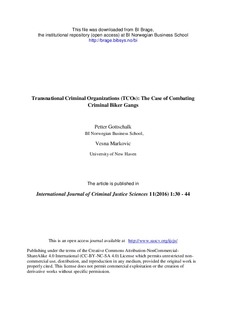| dc.contributor.author | Gottschalk, Petter | |
| dc.contributor.author | Markovic, Vesna | |
| dc.date.accessioned | 2016-07-01T13:12:20Z | |
| dc.date.available | 2016-07-01T13:12:20Z | |
| dc.date.issued | 2016 | |
| dc.identifier.citation | International Journal of Criminal Justice Sciences 11(2016) 1:30 - 44 | nb_NO |
| dc.identifier.issn | 0973-5089 | |
| dc.identifier.uri | http://hdl.handle.net/11250/2395271 | |
| dc.description | This is the article as published by the journal (open access). Available at http://www.sascv.org/ijcjs/ | nb_NO |
| dc.description.abstract | Transnational crime organizations (TCOs) represent a challenge to societies all over the world. This
article explores combating criminal biker gangs, where stakeholders in the community and governments
vary in their responses. These stakeholders include the government, law enforcers, courts, and the
communities. The variation in responses is conceptualized in terms of a four stage of growth model.
This model includes criminal biker gang members being treated as movie stars, individual criminals,
organized criminals, and finally, enemies of the state. A stage model is a theoretical approach to
understanding different levels of maturity in combating criminal biker gangs. Due to the great presence
and threat from biker gangs, Norway and Australia are used as examples to illustrate the model.
Further research should involve developing existing and new criteria for determination of maturity
level in combating biker gangs, as well as applying such criteria to other countries with large biker
gang populations. | nb_NO |
| dc.language.iso | eng | nb_NO |
| dc.publisher | South Asian Society of Criminology and Victimology (SASCV) | nb_NO |
| dc.title | Transnational Criminal Organizations (TCOs): The Case of Combating Criminal Biker Gangs | nb_NO |
| dc.type | Journal article | nb_NO |
| dc.type | Peer reviewed | nb_NO |
| dc.source.journal | International Journal of Criminal Justice Sciences | nb_NO |
| dc.description.localcode | 1,OA | nb_NO |
